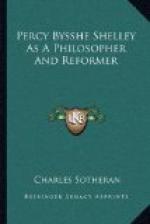“The doors to premature
and violent death,
To penury, famine, and
full-fed disease.”
Wealth was a living God, who rules in scorn, and whom peasants, nobles, priests, and kings blindly reverence, and by whom everything is sold—the light of heaven, earth’s produce, the peace of outraged conscience, the most despicable things, every object of life, and even life itself.
In a proper condition of society, which should be strictly co-operative, there would necessarily be no pauperism, and
“No meditative signs
of selfishness,
No jealous intercourse
of wretched gain,
No balancings of prudence,
cold and long;
In just and equal measure
all is weighed;
One scale contains the
sum of human weal.
And one the good man’s
heart.”
The fruits of Shelley’s enunciations on the labor and capital questions, and the school of political economists to which he belonged, have made wondrous progress. The world is beginning to see that labor has the unrestricted right of coalition, that there should be only a standard day’s work, according to the wants of society, with prohibition of labor for at least one day in the week; that legislation is required for the protection of the life and health of the working man, and that mines, factories, and workshops should be strictly controlled by sanitary officers selected by labor; that no children’s work should be permitted, or women’s, which may be considered unhealthy; that prison work should be regulated, and that laborers’ co-operative and benevolent societies should be administered independently of the State.
Liberals must learn from their enemies, must organize and let the ramifications of unshackled thought spread through the lands, and must, above all, conserve the control of education. Whereever there is a church or chapel, let there be beside it a hall or club, in which shall be inculcated the simple doctrines of a pure, integralised religion.
On the statute book of England there yet remains a law directed against the freedom of the press and discussion; to even discuss the question of the divinity of Christ was considered blasphemy, and the person so offending was punished most severely by the criminal laws. At the present time this wretched remnant of the dark ages is practically a dead letter. The friends of Shelley suffered from this most intolerant spirit. Keats, it is believed by many, was wounded unto death for daring to speak on behalf of freedom, and we are given glimpses in the Adonais of his feelings on the subject; Leigh Hunt and his brother were imprisoned and fined for the same; the publisher of the pirated edition of Shelley’s Queen Mab was cast into Newgate; Eaton, a London bookseller, had been sentenced by Lord Ellenborough to a lengthened incarceration, for publishing Paine’s Age of Reason, and hundreds of others suffered similarly. The abominable circumstance of Eaton’s conviction




